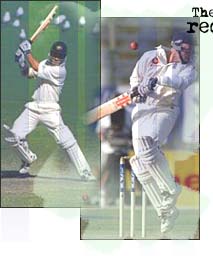
 January 24, 2001
January 24, 2001On the fringe...
Faisal ShariffEveryone has a story; everyone has an excuse. And everyone prefers to search for answers on the outside rather than peek within to find out what has gone wrong and where.
It is something I have noticed, and wondered about, ever since I took to writing about sports. And thus got to spend time -- off-the-record time -- with players. Time when the mask is off, and you can see one in his ture colours.
"Why am I not in the one-day team?" complains a player, who is only preferred for the longer version of the game.
He seems to think the reasons exist outside of himself. That there is some kind of conspiracy at work. Yet, I have never known him to look within himself. To look at the Sachin-Saurav pairing that now exists, and wonder if he is good enough to break it up, and insinuate himself into one of those two opening slots.
In 1991, a young cricketer, Pravin Amre by name, with limited talent and a limitless urge to play in the big league, broke into the Indian eleven.
When he was asked at the time whether he thought he had a chance of playing for the country, he said, "At the time I made my debut, there were players like Dilip Vengsarkar, Ravi Shastri, Sanjay Manjrekar, Sachin Tendulkar, Mohammad Azharuddin, Kapil Dev. And I still made the grade. That is what cricket has taught me -- that some things are not in your hands, you just have to keep playing, keep proving yourself."
For the record, Amre scored a century on debut at the Kingsmead ground, Durban, when the rest of the celebrated pack around him collapsed.
Sourav Ganguly and Rahul Dravid are other instances of players of wanting to be there, needing to be there. Players with a hunger to wear the national colours. And it is this hunger that allied with their talent to get them their breaks.
"Is the bench strength good enough to push the playing eleven to try harder to retain their place in the side?" asks a senior player. "There are some players who are just not cut out for the big league. Dodda Ganesh will always be good enough for the domestic scene, but just that touch short of international standard. And that is because mentally, he is a stock bowler and not a strike bowler," he adds.
 Leaving talent aside, it is the players with a hunger to play, a hunger to make it, that have the best chances of seeing their dreams come true. Take the example of Vijay Dahiya. By any yardstick, he is not the best wicket-keeper in the country today. His own team-mates agree that he has hard hands, and his collecting down the legside is not up there with the best. And yet, when time comes for team selection, these very team-mates will back him, make a push for his inclusion. Why? Because, though they accept that Nayan Mongia is technically the best we have in the country today ("He has got real soft hands and his collection down leg is a treat to watch," observes one Indian player), they believe Dahiya should play against Australia simply because he has this burning, gnawing desire to play for the country.
Leaving talent aside, it is the players with a hunger to play, a hunger to make it, that have the best chances of seeing their dreams come true. Take the example of Vijay Dahiya. By any yardstick, he is not the best wicket-keeper in the country today. His own team-mates agree that he has hard hands, and his collecting down the legside is not up there with the best. And yet, when time comes for team selection, these very team-mates will back him, make a push for his inclusion. Why? Because, though they accept that Nayan Mongia is technically the best we have in the country today ("He has got real soft hands and his collection down leg is a treat to watch," observes one Indian player), they believe Dahiya should play against Australia simply because he has this burning, gnawing desire to play for the country.
Wearing the national cap is a goal, a dream, an objective, a matter of pride for him -- and it is this feeling that will drive him to do his very best, within the limits of his talent and ability, while more talented players without the same burning drive will be content to just coast along.
Take, as a counter example, the case of Vinod Kambli -- enormously gifted, yet permanently sidelined. It is now six years and more since Courtney Walsh pitilessly exposed his vulnerability to the short-pitched stuff. Six years down the line, Kambli is still vulnerable to that line -- because in the interim, he has never made the least attempt to sort it out. The result? Today, even a Dodda Ganesh, seeing Kambli at the crease in a Duleep Trophy game, opts to attack him with short pitched deliveries on leg -- and succeeds.
So can Kambli blame anyone but himself for his current plight?
Recently, I got to chat with this pace bowler who kept cribbing about the nature of wickets in this country, and how they never afforded him any purchase. At one point, I asked him, "Never mind the wickets, when you find yourself playing on one of them, do you bowl to your potential, bowl to the best of your ability? Or do you simply look at the pitch and shrug and go through the motions?"
The bowler in question had no answer. Or rather, he did. With his silence, he did acknowledge that he lacked the spirit, the commitment, to do the best he possibly could on whatever surface presented itself to him.
Last year, after India's debacle Down Under, one of the axed youngsters told me something which got me thinking about the levels of complacency the bench had attained.
"We paid the price, we were sacked, because our seniors failed," he said. "If they couldnít cope with the conditions how could we? Why should we pay for their incompetence? "
At no point of time did I see, in him, a change in attitude -- that in the failure of his seniors lay his best chance to improve, to make a real bid to displace some of them. As for all that hoopla about camaraderie and the unity of the team, tell me the other one.
For some, playing for India is the end in itself -- how they play, how well they play, is not an issue, all they want, all they set their sights on, is getting to wear that cap, by hook or, often, by crook.
After India lost the first Test to South Africa in Bangalore last year, an off-spinner who made his debut in the side, said in the dressing room, "Chalo yaar, ek Test to khel liye. Ab chahe nikale jaye, koi gam nahi." (At least I played a Test match. Now even if I donít play again, no grief, no complaints! )
Frankly, I donít care if we donít win an away series for another ten years -- which we won't, anyway, if we continue to field teams made up of compulsively self-centered elements. But if in that period we are able to cultivate a culture of pride in representing India, if we can teach the younger players to give, in exchange for the honour of representing the nation, their sincerest effort, we would have accomplished a lot.
I had thought that after some of the seniors were axed in course of the recent match-fixing scandal, the new-look team would shed its in-bred suspicions and hostilities and insecurities. I was wrong. Before they learn to cope with the lifting deliveries of Donald and McGrath and the pure pace of Brett Lee and Shoaib Akthar, they need to learn the real meaning of that old saying, "Those who do not swim together, will sink seperately." They need to realise that this game is about achieving as a team, not about personal glory.
But it isnít all dark in the dressing room.
Last night, I got to speak over the phone with the same bowler who had earlier always complained about the pitches. I heard him say, with a confidence and determination I hadn't heard before: "This year, I will play for my team in South Africa, I will get wickets on the same pitches."
Wish you well, mate, I said to him. And during that chat, I was reminded of what Phil Jackson, coach of the Chicago Bulls, once said: that a successful team is one in which the "me" becomes the servant of "we".
Design: Devyani Chandwarkar
Illustration: Dominic Xavier
©1996 to 2001 rediff.com India Limited. All Rights Reserved.